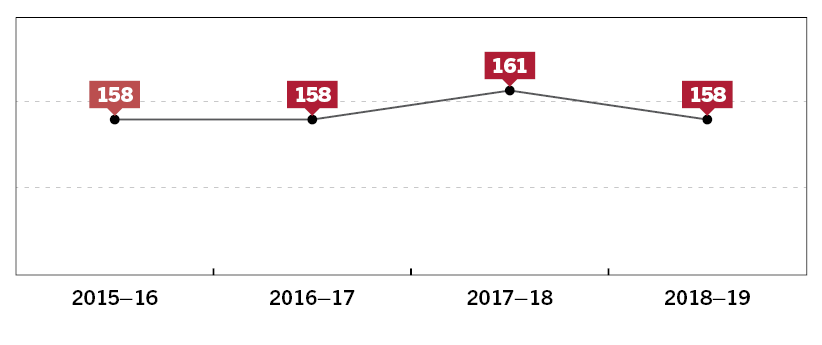Staffing
The Clerk of the Senate is appointed by the President of the Senate under subsection 58(1) of the Parliamentary Service Act 1999 after consulting senators. Staff are engaged under section 22 of that Act.
Additional support was provided to the department through secondment arrangements with the Office of Parliamentary Counsel, and by graduates participating in the Parliament of Australia Graduate Program.
Figure 17 shows that the average full-time equivalent staffing level for 2018–19 was 158, a decrease from 161 in 2017–18, chiefly reflecting the natural conclusion of contracts aligned to the 45th Parliament.
Further staffing statistics are provided in Appendix 2.
Figure 17 – Full-time equivalent staff numbers, 2015–16 to 2018–19

The department’s learning and development framework supports staff to develop and maintain relevant skills and knowledge. In 2018–19, the department offered 17 internal training sessions that focused on parliamentary skills and knowledge. Participation in learning activities is encouraged to ensure that staff continue to develop expertise in parliamentary practice and promotes capability of the highest standard of accurate and timely procedural advice. Thirty-five learning activities that focused on skills for the workplace, leadership, health and well-being and role specific learning (eg subject matter conferences) were also undertaken by staff in 2018–19. Financial assistance or paid leave (or both) is available under the department’s Studybank scheme, to assist ongoing staff to undertake tertiary studies relevant to the department’s objectives. In 2018–19, 13 employees accessed Studybank.
The department administered the 2019 Australian Public Service Employee Census in June 2019, with 102 staff choosing to share their views. The results will be analysed in the next reporting period.
Employment arrangements
The remuneration of the Clerk of the Senate, who is the holder of a statutory office, is determined by the President of the Senate after consultation with the Remuneration Tribunal.
The department’s five Senior Executive Service (SES) employees are covered by determinations made under subsection 24(1) of the Parliamentary Service Act 1999.
The department’s 179 non-SES employees are covered by the Department of the Senate Enterprise Agreement 2017 – 2020. One employee had an Individual Flexibility Arrangement with the Clerk in accordance with clause 7 of the enterprise agreement.
Employees work at Parliament House, Canberra. Two employees identified as Indigenous, compared with one in the previous reporting period.
In addition to salary, certain staff have access to a range of entitlements including leave, study assistance, a workplace support allowance, salary packaging, guaranteed minimum superannuation payments and other allowances. Employees can also use other services offered at Parliament House including the sporting facilities and the Parliamentary Library. The department’s employment arrangements do not provide for performance pay.
Work health and safety
In accordance with Schedule 2, Part 4 of the Work Health and Safety Act 2011, the department reports on certain work health and safety matters. In 2018–19 there were no incidents which required the giving of notice under section 38 of the Work Health and Safety Act and no investigations or notices under sections 90, 191 and 195 of that Act.